December at Kindermusik by Jan
Merry Christmas from all of us!
Merry Christmas everyone! We can’t believe that it’s nearly Christmas! Where has this year gone! We have had a very exciting time over at Kindermusik by Jan this month! We started December with a week ending our exciting themes and then had a very special Christmas week where the children became Santa’s reindeer, played in some ‘snow’, had lots of fun with jingle bells and were even left a special Christmas present from Father Christmas himself! Have a look at some of the fun we had…









































We would like to thank all of you for making the effort and dressing up for the Christmas week special, we loved the outfits!
From all of us here at Kindermusik by Jan, we wanted to wish you all a very Merry Christmas and a Happy New Year!
Fun craft
If you are looking for some fun activities to do at home over the Christmas holidays, don’t forget you can log in to the Christmas activities page on the website Kindermusik.com
Here are some lovely ones to try with your little ones!
Home made egg carton bells
Home made snow globes
The perfect Christmas gift
Do you know we offer gift vouchers for the perfect gift
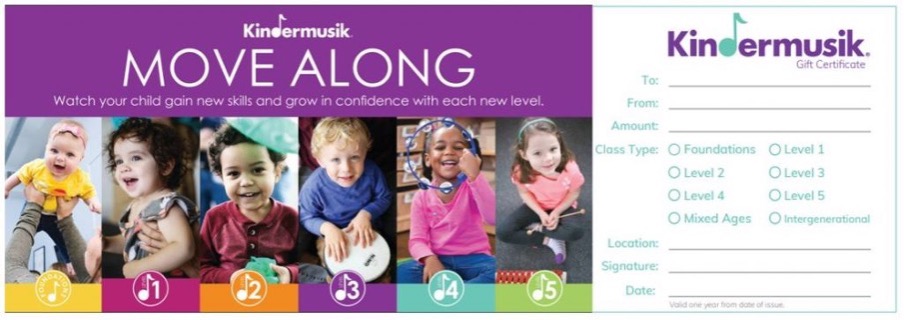
It’s not too late to give the gift of music for family and friends. We offer vouchers from £5 up to £30/£33 for a month’s worth of classes.
Email: kindermusikbyjan@outlook.com
How Musical Play Boosts Youth Sports Performance
What does early musical play have to do with youth sports? If you’re thinking of signing your toddler or preschooler up for t-ball, soccer, gymnastics, etc., take a look at these links between athletic ability and intentional music and movement. You may be surprised at how much it can help little ones gain confidence early in their sports journeys, and how much longer it might help them stick with it.
Music and sports are often viewed as two very separate entities, but they’re actually very closely linked.
You need muscle strength for both, balance for both, focus for both…the list goes on.
One can support the other, but what’s the argument for which comes first?
The most logical answer is that even newborns can engage in early musical play, and music lights up all parts of the brain needed for success in sports later on.
Here are 4 reasons you should practice early musical play with children before signing them up for sports, and as they pursue them, to help support their athletic abilities as they grow.
4 Ways Group Musical Play Helps Kids Thrive in Youth Sports
Hand Strength
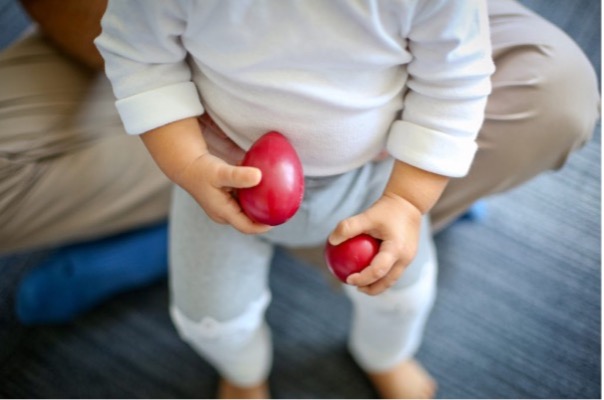
Supervised, age-appropriate instrument and prop play is an easy way to build up the same muscles needed for gripping a bat. From baby shakers to rhythm sticks, children can graduate from wider materials to more narrow items as their overall hand strength and pincer grasp increases. And when it’s time to step up to the plate, they’re ready!
Balance and Coordination
Balance and coordination mean so much more than being able to stand on one foot. In the world of sports, you need to be able to shift your weight quickly, move diagonally, spin on a dime, jump and land…all without falling.
In a Kindermusik class, this prep work starts in a newborn class. We begin introducing balance and coordination by rocking babies to the music, which promotes spatial awareness and equilibrium. Next, we start to cross the midline (meaning the middle of the body) to help one side of the brain connect to the other. This is essential to developmental milestones like bilateral integration, which may start with passing an instrument from one hand to the other. That leads to grasping important sports skills like passing a tennis racket from the right to the left hand without dropping it during a match.
We love using the song “Dr. Knickerbocker” (you can stream it for free on the Kindermusik app) to help children of all ages cross the midline.
For example, when you hear “Now let’s put the rhythm in our feet,” model crossing the midline by reaching right hand to left foot and left hand to fight foot. For babies, do it for them while they’re in your lap.
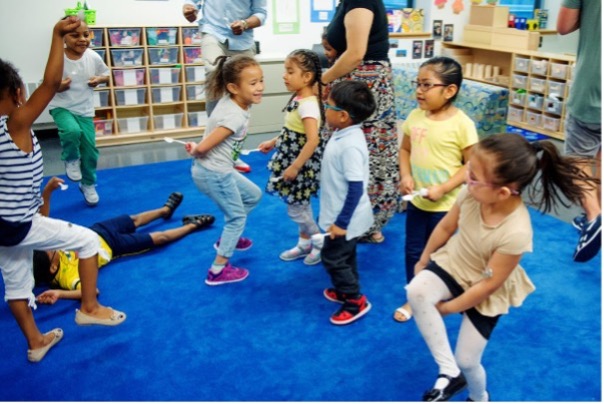
Steady beat is another critical aspect of coordination. It affects much more than physical abilities (like handwriting, language acquisition and expression, and more), but it’s key to running, cycling, dancing, and all forms of athletic performance.
Shared musical play incorporates steady beat by using everything from tapping along to the beat to twirling in circles.
Emotional Regulation
Playing sports is emotional, so learning how to stay focused, share plays, and deal with losses is key. Practicing music and movement in a group setting sets up positive social-emotional behaviour children need to succeed in a team setting.
Within an early musical play class, you might see this in the form of freeze dance, which boosts self-control and listening skills. Shared instrument play—like passing the drum around in a circle—is another easy and effective away to encourage turn-taking and respecting others.
Improvisation
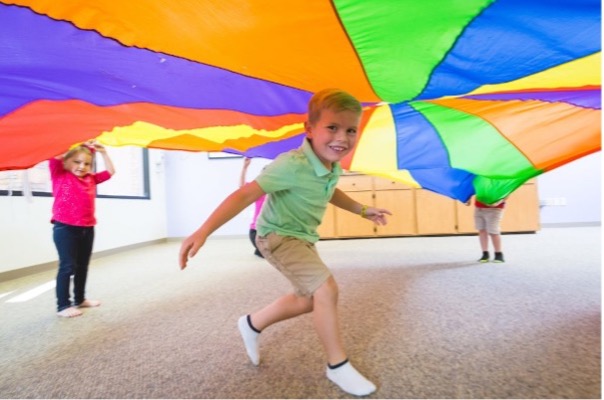
One of the best parts about any type of play is making things up as you go. That’s why child-led activities are so important. Improvising during musical play really gives children the confidence they need to shift gears and try something new in other arenas, like sports.Shared music-making might start with modelling how to rub those sand blocks together, but it leads to “What other ways can you make sounds with your sand blocks? I see you’re tapping them on the floor!” This kind of exercise gives children centre stage, acknowledges their creative choices, and gives them the motivation they need to keep exploring—all of which easily translates to the playing field!
Whether you’re already knee deep in a team sport, thinking about it for next semester, or know it’s in your children’s or students’ future and want to give them a head start, consider incorporating the power of shared musical play to boost those early athletic skills. It’s as much about the emotional component as it is the physical one, and we know that play—in any form—is much more likely to encourage persistence.
**We Need Your Help!**
As a small business, we continuously rely on your support to help spread the word about our classes. Without families like yours, we wouldn’t be able to offer these valuable programs. We understand that times are tough, and many parents need to be more selective with their spending due to financial constraints.
Since our classes are designed for one-on-one parent-and-child interaction, there’s limited opportunity for photos and videos during sessions, and we don’t want to disrupt your experience by asking for them. However, if you do capture any moments, we would be thrilled if you could share them with us or post on your platforms and tag us. Your support means the world to us!
**Other Ways to Spread the Joy!**
**Share the Love**: Invite a friend to join for a free trial class! Please email to book:
Email: Kindermusikbyjan@outlook.com
**Spread the Word**: Tell your friends, family, and anyone who might be interested in our enriching music classes! Share our details on WhatsApp, Instagram, and Facebook. Don’t forget to mention nurseries, baby groups, and schools!
**Website:** (Book a trial class) – (https://www.kindermusikbyjan.co.uk/trial-class/) & [View Our Classes] (https://www.kindermusikbyjan.co.uk/classes/)
**Don’t Forget:** Capture the fun during class and tag us in your social media stories and posts! We love seeing our Kindermusik families enjoying their musical adventures. ✨
We truly appreciate your support and look forward to welcoming more families to our musical community. If you have any questions or need more information, feel free to reach out to us at mailto:Kindermusikbyjan@outlook.com
Thank you for being a valued part of Kindermusik. Let’s make music together and share the joy with others!
————————————————————————————————————
Dates for the diary
Christmas break – 15th December 2025 – 9th January 2026
(Return w/c 12th January)
February 1/2 term – 16th – 20th February 2026
Easter holidays – 30th March – 10th April 2026
Bank Holiday Monday – 4th May 2026
May 1/2 term – 25th May – 29th May 2026
Last day before summer break – 10th July 2026
Have a musical day!
Row, Mary and Antony xxx
————————————————————————————————————
November at KIndermusik by Jan
Hello November!
Brrrrr the temperature is definitely dropping, and Christmas is just around the corner! We hope you have had a lovely cosy November. We have been very busy at Kindermusik by Jan this month and are hard at work prepping all the classes for our Christmas Special next week! We have also started some very exciting themes this week.
We have all had a great time chugging along…yes you guessed it, our themes have been all about the farm! We have been enjoying tractor rides whilst enjoying being and seeing our favourite farm animals.
Give the gift of music this Christmas:
It’s not too late to give the gift of music this Christmas! For more info, drop us an email at kindermusikbyjan@outlook.com and we can send you one of our vouchers so you can pay for a family member or friend to come and experience our classes!
We are offering both one off trial class vouchers for £5 and monthly class vouchers from £30 to £33. Email kindermusikbyjan@outlook.com for more info and for prices. Giving the gift of music – the perfect present!
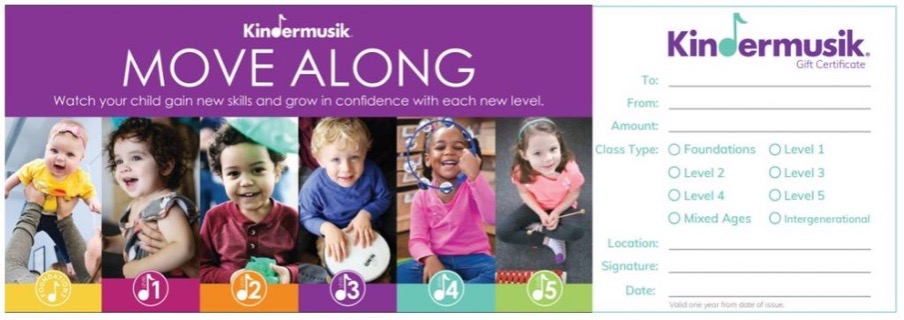

Christmas holiday fun!
As many of you know now, we are big fans of the national trust. They offer such lovely trails and themes at Christmas time, which are often free to do! Our local gardens are:
Wakehurst, Nymans, Sheffield park and Standen house.
https://www.nationaltrust.org.uk/visit/sussex/christmas/index
Borde hill gardens are also doing a Christmas trail this year.
https://bordehill.co.uk/events/a-family-christmas-at-borde-hill/
Whatever Christmas activities you decide to do, we hope you have a lovely time together.
Don’t forget to log onto Kindermusik.com where you can access lots of lovely Christmas crafts to enjoy with your little one!
A shout out for the Dads!

Dads, like-a-dads, uncles, grandfathers…the male caregiver role is hugely important to early nurturing and positive whole-child development.
To amplify their presence and put it to the tune of fun, we created Superdad Soundwaves, on the free Kindermusik app. And we’ve got an activity you can pair with it below!

What the research says…
Studies show that fatherhood involvement in the early years makes a big difference.
Researchers from Imperial College London, King’s College London and Oxford University found that “babies whose fathers were more engaged and active when playing with them in their initial months performed better in cognitive tests at two years of age.”
And a study conducted by the University of Leeds showed that fathers who regularly and intentionally engaged their three-year-olds by reading, drawing, singing, and playing “helped their children do better at school by age five.”
Empowering dads with the tools they need to keep that engagement going is where musical play can really help. It’s a multisensory activity that’s portable, screen-free, and fun!
Try our Dad Album activity…
- Stream “Love Somebody” from the Superdad Soundwaves album in the free Kindermusik app or play it below.
- Follow the movement directions—dancing high/low, bouncing, clapping, etc.
- Each time you hear “you, you, you,” give your child a big hug or point to them.
The benefits…
This activity is full of cognitive, social-emotional, and motor benefits, but we love that:
- Matching movements to lyrics promotes understanding and language acquisition.
- Synchronizing movements synchronizes your heartbeats and bodies, promoting connection.
Keep that family engagement going…
Intentional time is the best time. Make it part of your daily routines, and growth and connection will skyrocket.
**We Need Your Help!**
As a small business, we continuously rely on your support to help spread the word about our classes. Without families like yours, we wouldn’t be able to offer these valuable programs. We understand that times are tough, and many parents need to be more selective with their spending due to financial constraints.
Since our classes are designed for one-on-one parent-and-child interaction, there’s limited opportunity for photos and videos during sessions, and we don’t want to disrupt your experience by asking for them. However, if you do capture any moments, we would be thrilled if you could share them with us or post on your platforms and tag us. Your support means the world to us!
**Other Ways to Spread the Joy!**
**Share the Love**: Invite a friend to join for a free trial class! Please email to book:
Email: Kindermusikbyjan@outlook.com
**Spread the Word**: Tell your friends, family, and anyone who might be interested in our enriching music classes! Share our details on WhatsApp, Instagram, and Facebook. Don’t forget to mention nurseries, baby groups, and schools!
**Website:** (Book a trial class) – (https://www.kindermusikbyjan.co.uk/trial-class/) & [View Our Classes] (https://www.kindermusikbyjan.co.uk/classes/)
**Don’t Forget:** Capture the fun during class and tag us in your social media stories and posts! We love seeing our Kindermusik families enjoying their musical adventures. ✨
We truly appreciate your support and look forward to welcoming more families to our musical community. If you have any questions or need more information, feel free to reach out to us at mailto:Kindermusikbyjan@outlook.com
Thank you for being a valued part of Kindermusik. Let’s make music together and share the joy with others!
—————————————————————————————————————
Dates for the diary
Christmas special week (Christmas jumpers or dress up optional) – 8th December – 12th December 2025
Christmas break – 15th December 2025 – 9th January 2026 (return 12th January)
February 1/2 term – 16th – 20th February 2026
Easter holidays – 30th March – 10th April 2026
Bank Holiday Monday – 4th May 2026
May 1/2 term – 25th May – 29th May 2026
Last day before summer break – 10th July 2026
Have a musical day!
Row, Mary and Antony xxx
———————————————————————————-
October at Kindermusik by Jan
October Blog post of end of oct after Halloween week
Hello! It is officially Autumn! We hope you all had a restful half term and enjoyed lots of Autumnal fun with your little ones!
Spooky goings on as Kindermusik celebrates Halloween!
We have had so much fun at Kindermusik by Jan for our Halloween week! Lots of our families enjoyed dressing up and our classes were attended by cats, spiders, pumpkins and witches as well as favourite characters like superheroes!
Our educators added a spooky twist to their lessons, making scarves twirl like ghosts, rolling around like pumpkins, flying on our broomsticks like witches, creeping like spiders and jumping around like warty toads! We hope you had lots of fun too! Here are some highlights from our Spooktacular week!










































Row
At the beginning of half term, we watched the hot wheels show in London. It was so much fun; the best part was watching a real car complete a loopy loop (everyone held their breathe).
We had a quieter half term as Hugo had to have an operation over half term, so we had lots of medical appointments leading up to it. The operation was a success, and he’s been doing well. He is a super brave boy!
Amongst our appointments we managed to visit Legoland, it was a very wet day but super fun!
For Halloween we visited Glow balls mini golf which had a special Halloween theme. We then went trick or treating, Rocky also joined in and was dressed as a spider!
It was lovely to have a bit of a rest and some time with the children.










Mary
“Mine was a lovely half term, although frantically busy juggling nursery work, seeing friends and most of all helping put on the show ‘Shrek Jnr’ with my youth musical theatre group! Back to my ‘normal’ working week this week, for a rest! Hope youve all had a great week too!”

Antony
Hi Mums, Dads and other caregivers!
Half term was exceedingly busy for us all as a family. At the weekend I did some filming for a company that makes showreels. In the Acting world you generally need a showreel to advertise your screen acting ability. Four actors were hired and we had scenes specially written for our ages/look/personalities. Fingers crossed that it all turns out ok…and that it gives rise to some TV/film work!
Much of the week was spent decorating (wallpapering, which I was very proud of!!), and sorting out all the baby/toddler clothes, toys and books we have accumulated over the years. It’s been lovely to actually be able to see some of the floor of our spare room!! Other than that it’s been about keeping our 11 year old son occupied and entertained eg countryside walks, Wakehurst, Wood and Wild in Hurst, ten pin bowling in Brighton, Trick or Treating in Burgess Hill. Our son has also had a successful swimming trial for Marlins Swim Club and passed his Grade 3 singing exam with distinction! I am one proud father!
Looking forward to seeing you all in the run up to Christmas (sorry, I mentioned the ‘C’ word!
Love Antony x
Did you know we offer gift vouchers?
With the new academic year in full swing, there are lots of birthdays, kids parties to go too, baby showers and. Christmas is on the horizon (sorry, did someone mention Christmas!) If you are struggling for a gift idea, why not consider a kindermusik voucher.
We are offering both one off trial class vouchers for £5 and monthly class vouchers from £30 to £33. Email kindermusikbyjan@outlook.com for more info and for prices. Giving the gift of music – the perfect present!


The benefits of Kindermusik
Kindermusik is helping your child’s development in so many ways! We have found that it is helpful to share these benefits with you in class in order to help you understand why we are doing certain activities and to be able to further help your child. It really is amazing all of the different ways that coming to class can help your child’s development. Benefits from coming to class include:
- Helps social skills like working together, sharing and taking turns
- Improves early maths and literacy development
- Develops fine and gross motor skills
- Improves listening skills
- Helps develop balance and a sense of rhythm
- Helps develop vocabulary
- Develops spatial awareness
And most importantly classes are super FUN!
SNAIL TAPPING – save our wildlife
As the weather has turned wet, it brings snails. If your little ones are anything like mine and like to hold and pick up bugs of any kind then this is a useful bit of advice.
I did not know that if I picked a snail off the ground to move them to a safer place I could cause potentially pain if I did not do it properly, by just ripping the snail away from the ground.
It can also cause the mantle to collapse which could kill the snail.
Although a snail does not have a brain-in the same way that a human has, they do have a nervous system through their body and many scientists think that their reaction to certain stimuli have proven that they experience pain.
Although it has not been proven 100%, I do not wish to risk hurting this fragile creature, or killing them by causing the mantle to collapse.
I was horrified that I had been doing this all these years, but was so grateful to those who shared this information to me.
So to prevent either of these happening you just need to tap a snail on their shell to make them retract their body into the shell before you move the snail.
Just pulling them away from the ground- is potentially excruciatingly painful for the snail and will often result in their death.🥲
Please become a snail tapper.
We so need these little guys to maintain the wildlife balance in our gardens.
We hope you enjoy reading our blog!
Lots of love Row, Mary and Antony xx
————————————————————————————————————
September at Kindermusik by Jan
Hello! Welcome to the start of our brand-new term! We hope you’ve had a lovely summer break making memories with your little ones! In this month’s blog, you can see what we’ve been up to over the summer break. We can’t wait to hear what you’ve all been up too!
Our Summer!
We’ve all been enjoying spending time relaxing in different ways this summer. Read on to find out how
our educators have been spending their well-earned break…
Row – Business owner
We’ve had a non-stop, fun-filled summer together as a family, and I really made the most of switching off and being fully present with my loved ones. It’s left me feeling refreshed and ready for the new term ahead.
This year we treated ourselves to a big holiday in the Maldives (usually we’re happy campers ⛺, but this time we decided to go all out before life changes a little with our new addition!). We know it’ll be back to camping holidays for the next few years, so we wanted one big adventure.
The trip was incredible – we spent our days swimming in the pool and the sea, enjoying delicious food, and snorkelling. We were lucky enough to spot stingrays and even sharks, which was such a magical experience for us all. ????✨
And then, almost as soon as we got back, our newest family member arrived… Rocky! ???? He’s been keeping me busy with potty training and settling in, but he’s already doing brilliantly. Labradors are so food-orientated, which makes training a little easier (thank goodness for treats!). It honestly feels a bit like having a toddler in the house again. You might even get to meet Rocky soon, as I’ll occasionally bring him into Kings with me – don’t worry though, he won’t be teaching alongside me! ????
Because of Rocky, our little outings this summer have been shorter, but still wonderful. We’ve loved visits to Borde Hill, Latchetts Farm, woodland walks, bike rides at Ardingly, and trips to Nymans and Sheffield Park.
It’s been such a special summer, but now I’m really looking forward to seeing you all again and getting back into the swing of things this term!











Mary
It’s been a wonderful summer although it’s definitely gone too quickly! It was great to see so many of you at our Summer specials, going to the beach and the zoo has never been so much fun! Having worked for most of the hols it’s been wonderful to unwind with a couple of week’s in the sun! Im now fully re-charged and very excited about another year of Kindermusik fun! See you all soon!

Antony
It’s been an extremely eventful summer for our family. Here are a few photos to give you a flavour. For his 11th birthday our son, Louis, was treated to a day in London which included the iFly at the O2 which he absolutely loved. Afterwards we went on the London Eye, something we’ve been meaning to do for years. The weather was amazing so we got some fabulous photos.
We also spent a few days at BlackBerry woods near Plumpton and stayed in an amazing treehouse. Louis has been a fan of the Enid Blyton Magical Faraway Tree books and the 13 Storey Treehouse collection by Andy Griffiths, so to stay in an actual treehouse was a dream come true!
Much of our summer was spent ferrying Louis to and from the Theatre Royal, Brighton where he was playing Gavroche in Les Misérables. I spent a lot of time back stage chaperoning the children but I also managed to see it three times! What an achievement! It was such an amazing production and had some great reviews from the local press and friends and family who went to see it.
We also managed to buy a last minute getaway to Crete in the last week of August. A perfect way to round off the summer. We stayed at a beautiful hotel on the north coast near the picturesque town of Rethymno. Lots of swimming, relaxing by the pool or on the beach, sightseeing and delicious food. I think we’ll be making a return trip in the future!
I look forward to seeing you all again for a new year of making music!







Why Steady Beat Matters + How to Assess It
You know that thing that makes you want to rock, sway, clap, or tap to the music? That’s steady beat—the ongoing, repetitive pulse that occurs in songs, chants, and rhymes.
But it’s more than just an ideal skill for dance or instrument lessons—steady beat is a critical aspect of early childhood development that affects everything from walking, to reading, to dribbling a basketball.
Even in-utero, babies respond to the steady beat of their mother’s heart or the songs she sings. Starting at two years old, you can begin to assess whether or not a child can internalize steady beat in an age-appropriate way, or whether they need more practice in order to fuel success in school and beyond.
First, let’s look at the science behind steady beat and its practical benefits.
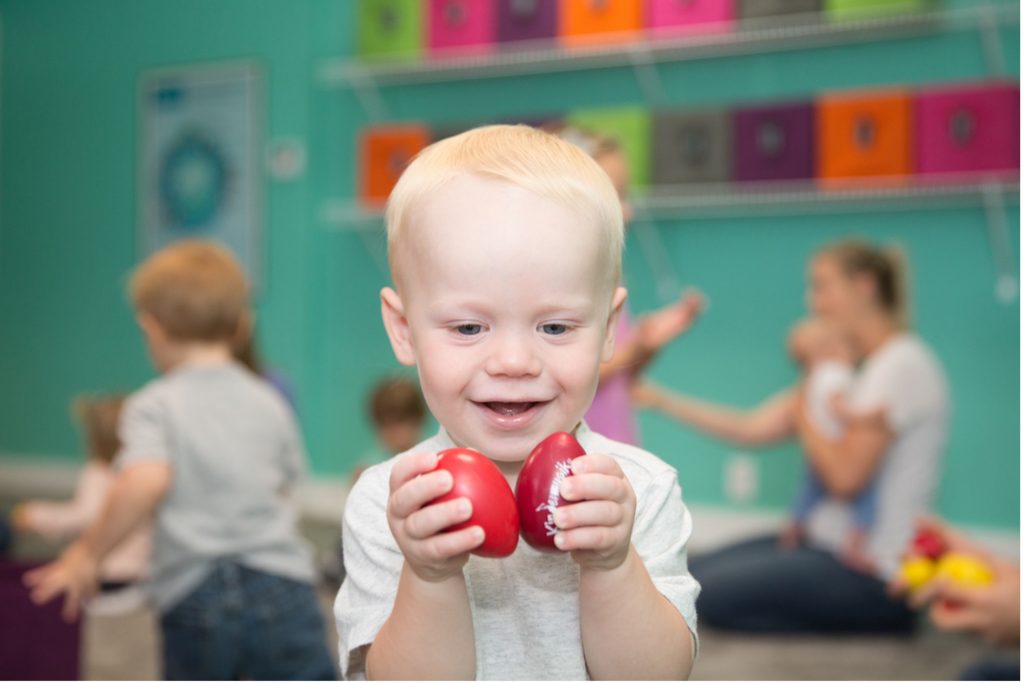
4 Ways Steady Beat Fuels Development
- Cognitive Development: Engaging with steady beat helps children develop important cognitive skills such as pattern recognition, memory, and attention. These are great stepping stones to learning to count and memorizing sight words.
- Language and Literacy: A strong sense of rhythm has been linked to improved language development and literacy skills. The rhythmic patterns of music mirror the patterns of language, helping children enhance their phonological awareness—a key predictor of early reading success. In fact, a study conducted by Northwestern University suggests that preschoolers between ages 3 and 4 who can demonstrate beat synchronization show stronger reading preparedness.
- Motor Skills: Keeping a steady beat requires control which, in turn, supports the development of fine and gross motor skills. Activities like tapping egg shakers together build hand strength and precision (hello, handwriting!), while circle dances increase whole-body coordination (think: balance and safety).
- Social-Emotional Benefits: Group musical play often requires moving and grooving in sync, which supports early social skills like cooperation, turn-taking, and empathy. Building these relationship foundations early is directly linked to positive academic and general growth.
So, we know steady beat feeds into developmental milestones, but what about how it’s affecting your child or student? The next step is assessing competency and determining how to take it to the next level.
4 Ways to Assess and Increase Steady Beat Competency in Children
While babies can express steady beat competency, when it comes to school readiness, looking for success between ages 3-5 is key.
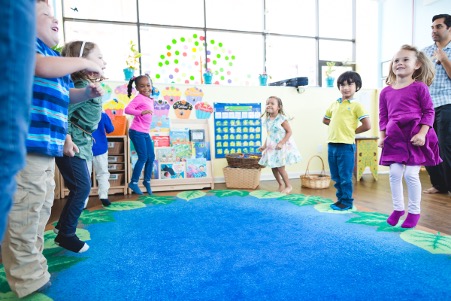
- Observe their natural reactions to music. Do they tap, clap, or dance in time?
- See if they can match your steady beat. Clap a steady beat while saying, “clap, clap, clap…” and encourage them to clap with you. Can they match your beat?
- Notice how they play with instruments. Provide simple instruments (like egg shakers) or homemade ones (like a pot and wooden spoon) to play along to the music. Can they play along to the beat closely or exactly?
- Test call and response. Sometimes called “echo games,” encourage your child(ren) to repeat your words to mimic steady beat through language rather than movement. The chant “Parrot Talk” on the free Kindermusik app is an easy and fun activity to try.
Here’s the most important part of any assessment: make it fun! Musical play should be naturally joyful—not forced— so that even when you’re silently observing, everyone is having a good time.
Remember, in all aspects of whole-child development, it’s about progress not perfection.
Some children may be able to recognise steady beat and be able to express it externally around two or three years old, while others may develop this skill later. Encouraging learning steady beat in joyful musical play is one stress-free way to meet those school readiness checklists head-on.
For any families with older (Girl) siblings or friends age 8yrs old to 14yrs old.
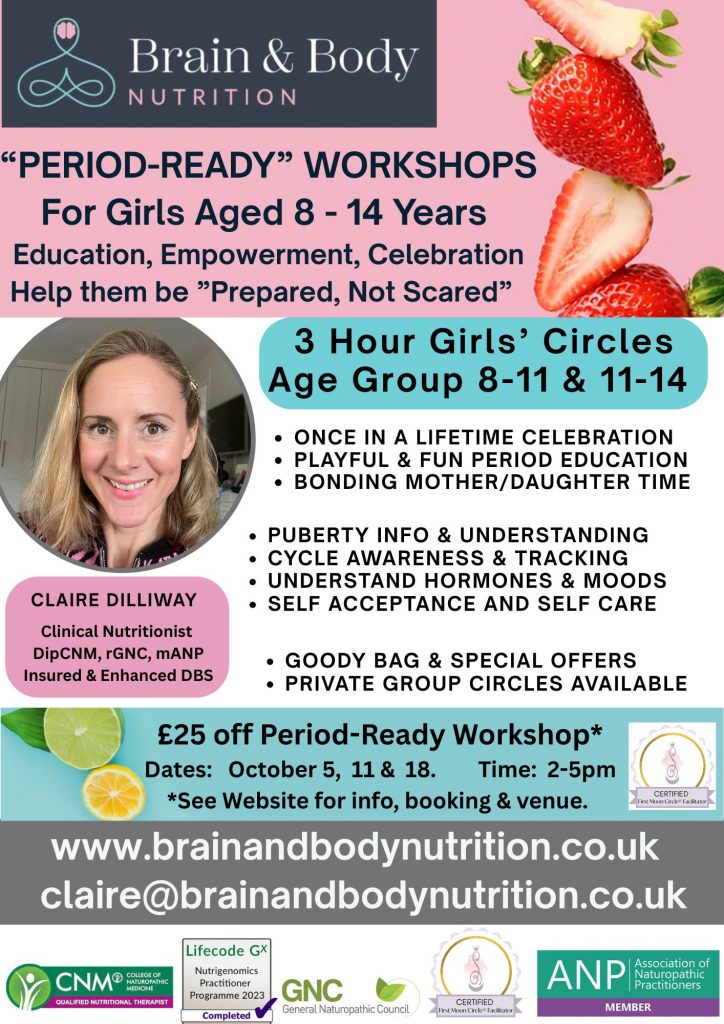
Hello, my names Claire and im a local Nutritionist who specialises in Female Hormonal Health from puberty to menopause, im launching “First Moon Circles” this October. These are 3 hour “Period-Ready Workshops” for 8-14 year old girls (& their Mums), in order to teach girls about their bodies, their periods, their cycles, the physical and mood changes involved, what to expect, how to know when to seek help, and much much more.
Helping young girls to be informed, “prepared, not scared”, educated, empowered, supported and celebrated, during this exciting and once in a lifetime rite of passage.
Launch offer of £25 off, and tickets include a tea break, a special gift and gift vouchers towards other services too.
Give your daughter the gift of cycle awareness, puberty understanding and empowerment, self-acceptance and self-care during their menstruating years, and a celebration of the beautiful woman that they are becoming.
Full info at www.brainandbodynutrition.co.uk or email questions to claire@brainandbodynutrition.co.uk
Dates for the Diary
2025/2026 dates
Halloween special week (dress up optional) – Monday 20th – Friday 24th October 2025
October 1/2 term – 27th October – 31st October 2025
Christmas special week (Christmas jumpers optional) – 8th December – 12th December 2025
Christmas break – 15th December 2025 – 9th January 2026
February 1/2 term – 16th – 20th February 2026
Easter holidays – 30th March – 10th April 2026
Bank Holiday Monday – 4th May 2026
May 1/2 term – 25th May – 29th May 2026
Last day before summer break – 10th July 2026
Have a musical day!
Row, Antony and Mary xxx
—————————————————————————————-
July at Kindermusik by Jan
What a year it’s been! We’ve had so much fun this year and are so grateful to all our families for coming along to classes each week. It has been such a joy getting to know you and your children and we have loved every minute of it. This month on the blog, our Kindermusik team share their highlights of the year and celebrate the end of term and look ahead to some of the themes you will be exploring in our Autumn term!
Summer play dates – Book ahead!
We have two one off classes running to the same timetable. Classes must be booked by the 25th July
Wednesday 30th July & Wednesday 20th August
Cost – £10 per participating child, Please note younger siblings are welcome on laps at no cost, older siblings who do not wish to participate are welcome to sit at the back of the room.
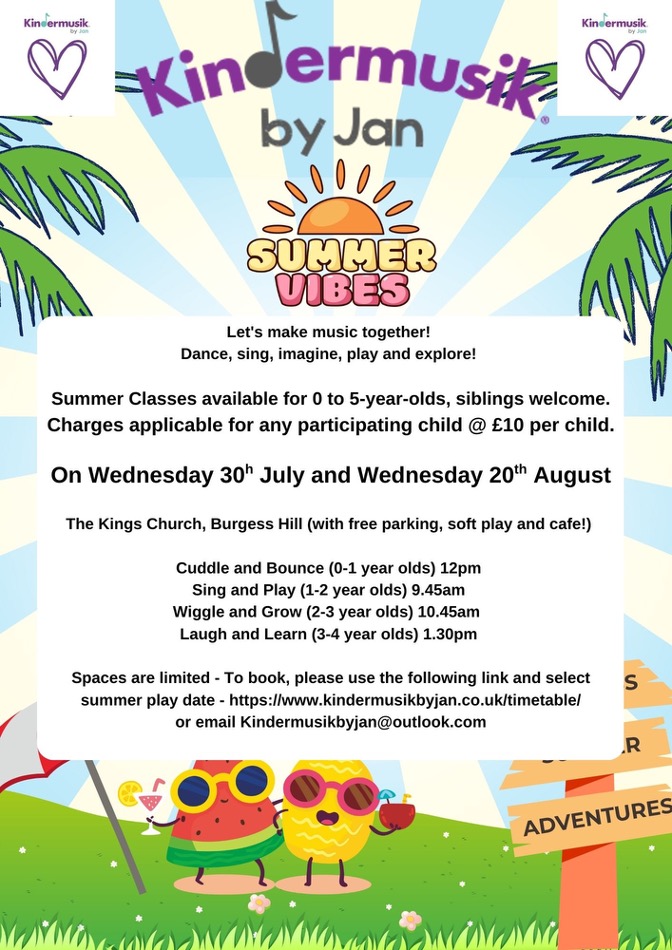
Our yearly highlights!
We’ve been thinking back over the last year and wanted to share with you our top moments!
Row: “I can’t believe another year has passed. It’s honestly been so lovely meeting you all and just seeing your little ones developing and growing each week. I feel so blessed you have chosen Kindermusik by Jan to be a big part of your child’s journey, its truly an honour! I am so grateful for everyone’s support.
I have had the pleasure of teaching this year, I plan to teach more regularly next year and am so excited to be part of your child’s journey.
I loved teaching the easter special and that was one of my biggest highlights of the year!
It’s been so lovely popping into some of your classes and meeting you. Seeing your children’s confidence grow each week having fun has been my personal highlight of the year. Long may it continue!”
Antony:
Have we really come to the end of another year of Kindermusik?
It doesn’t seem possible. We’ve managed to avoid the effects of Trump’s tariffs, and we haven’t been drawn into any conflicts, although Tuesday afternoon’s Laugh and Learn class sometimes feels like I’ve survived a major battle!!
I’ve been asked to write down my ‘best bits’ from the year but this feels like an impossible task. It’s been an absolute pleasure watching your children grow and achieve through the power of music. It’s just a shame other parents aren’t in on the ‘secret’ that is Kindermusik. Not only have your children gained music skills, they’ve grown in confidence and developed those all-important skills of coordination, social skills, motor skills, communication skills etc etc.
It’s so exciting when a Wiggle and Grow child finds they can play chime bars, not only in time to the song but also to play two mallets simultaneously. I love it when a Laugh and Learn child sings the goodbye song perfectly in tune. Then there’s the Move and Groove child who can read the rhythm and notes of a short melody. Not only are they developing their music skills they are also developing their reading skills.
What makes me smile most is when I have to try and teach while children are telling me about their recent visit to their grandparents or to the park, usually at the most inopportune moment! It also makes me laugh when I need to mediate between a contest for the worst ‘injury’ or when they talk over each other to show me their new dress/shoes/toy!! ?
Also, I’d like to take this opportunity to thank all of the parents/grandparents/carers who partake in the classes so enthusiastically. This is what makes Kindermusik work and makes it so special. One of my favourite activities in all age groups are the circle dances. There are so many activity benefits happening – social skills, spatial awareness, recognising patterns in music (skills required for Maths and science) – as well as moving in time and just having fun.
Have a fabulous summer everyone. Keeping singing and dancing.
Antony x
Mary:
What a lovely year! It’s been so great to see the progression the children have made in so many areas. Seeing little minds at work as they problem solve and try out ideas underpins so much of what Kindermusik. The look of awe and excitement when children create sounds or play in time or sing with each other is wonderful! Obviously, the children are growing physically too and achieving milestones like first tooth, first steps, and first words. It’s such a privilege to be part of their journey.
Thank you to every child, parent, and grandparent who has been part of my Kindermusik family this year. Here’s to a lovely summer ( don’t forget the specials on 30th July and 20th August!) and lots more fun and musical memories in September!
Mary x x x
NEW Dad Album + Activity!
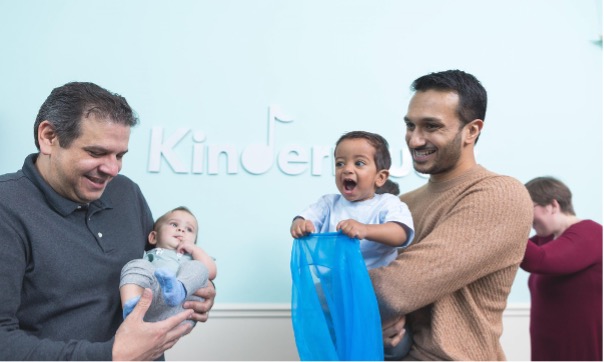
Dads, like-a-dads, uncles, grandfathers…the male caregiver role is hugely important to early nurturing and positive whole-child development.
To amplify their presence and put it to the tune of fun, we created Superdad Soundwaves, on the free Kindermusik app. And we’ve got an activity you can pair with it below!
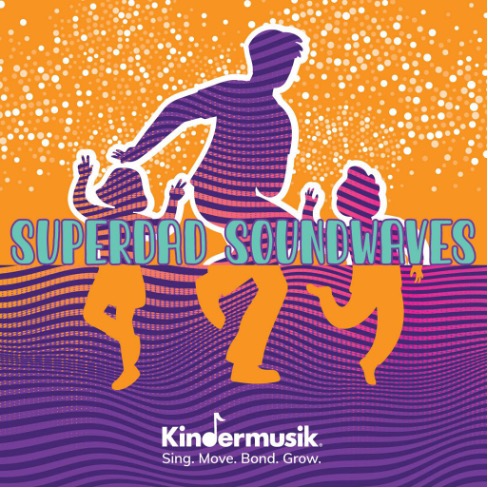
What the research says…
Studies show that fatherhood involvement in the early years makes a big difference.
Researchers from Imperial College London, King’s College London and Oxford University found that “babies whose fathers were more engaged and active when playing with them in their initial months performed better in cognitive tests at two years of age.”
And a study conducted by the University of Leeds showed that fathers who regularly and intentionally engaged their three-year-olds by reading, drawing, singing, and playing “helped their children do better at school by age five.”
Empowering dads with the tools they need to keep that engagement going is where musical play can really help. It’s a multisensory activity that’s portable, screen-free, and fun!
Try our Dad Album activity…
- Stream “Love Somebody” from the Superdad Soundwaves album in the free Kindermusik app or play it below.
- Follow the movement directions—dancing high/low, bouncing, clapping, etc.
- Each time you hear “you, you, you,” give your child a big hug or point to them.
The benefits…
This activity is full of cognitive, social-emotional, and motor benefits, but we love that:
- Matching movements to lyrics promotes understanding and language acquisition.
- Synchronizing movements synchronizes your heartbeats and bodies, promoting connection.
Keep that family engagement going…
Intentional time is the best time. Make it part of your daily routines, and growth and connection will skyrocket.
Looking ahead to Autumn…
It seems a way off at the moment, Autumn is just round the corner and bringing with it, some exciting themes! Our babies will be chirping like birds, our younger toddlers will be thinking about all the fun things we can do around our house, our older toddlers will be talking about how we feel, … our 3-4 year olds will be out and about! We also have our spooktacular Halloween week coming up W/C 27th October!
Dates for the diary:
Autumn term starts:
- Return after summer break – 8th September 2025
- Halloween special week (dress up optional) – Monday 20th – Friday 24th October 2025
- October 1/2 term – 27th October – 31st October 2025
- Christmas special week (Christmas jumpers optional) – 8th December – 12th December 2025
- Christmas break – 15th December 2025 – 9th January 2026
We hope you have a wonderful summer and we can’t wait to see you in September!
Please continue to spread the word to your friends , families, and other parents. Thank you for your continued support, it means the world.
Have a musical summer!
Row, Antony and Mary xxxx
——————————————————————————————–
June at Kindermusik by Jan
How is it already June?! Summer has finally arrived and we’re having a brilliant time for the second half of our summer term with themes celebrating our love of music, and all the things our toddlers can do by themselves!
This month on the blog, we’re giving you some summery inspiration for fun with your little ones, some crafty ideas using our Kindermusik App.
Summer ideas
We know it can be really hard to think of things to do when classes finish for the summer when you have little ones so click on the below links for some ideas for family days out this summer!
- Events around Sussex | Lets Go With The Children
- 20 Best Things To Do In West Sussex Near Me | Attractions in West Sussex | Day Out With The Kids
- Sussex | National Trust
- Family Fun things to do (visitsoutheastengland.com)
Kindermusik App and Crafts
Did you know we have a Kindermusik app for phones? Once you have downloaded the app, you will need to log into your account.
The Kindermusik’s app features include:
Lots of your favourite Kindermusik songs (organised into different themes like animals, weather, our bodies, colours and instruments)
Digital instruments
Make your own music by playing along to different tracks
Craft ideas
Recipes
Class demo videos
Nursery Rhymes
Your story books from your Kindermusik class
Download it today and enjoy your favourite Kindermusik activities on the go!
You will also receive weekly activities to enjoy at home if you sign up to: https://try.kindermusik.com/kids-activities/
Each week, you’ll receive:
· A themed activity kit
· An easy-to-make craft
· A how-to video + written instructions
· Musical pairings with each activity
· Parenting tips
· Access to Kindermusik songs
· And more!
Summer play dates
To keep Kindermusik alive for your little ones over the summer break, we are offering summer play dates for two days only.
Why not invite friends along to enjoy some fun too!
Booking closes on 18th July, so please secure your space early on! Spaces can be booked online.

Music improves baby brain responses to music and speech
Molly McElroy
Institute for Learning & Brain Sciences

Rock your baby in sync with music and you may wonder how the experience affects her and her developing brain.
A new study by scientists at the University of Washington’s Institute for Learning & Brain Sciences (I-LABS) shows that a series of play sessions with music improved 9-month-old babies’ brain processing of both music and new speech sounds.
“Our study is the first in young babies to suggest that experiencing a rhythmic pattern in music can also improve the ability to detect and make predictions about rhythmic patterns in speech,” said lead author Christina Zhao, a postdoctoral researcher at I-LABS.
“This means that early, engaging musical experiences can have a more global effect on cognitive skills,” Zhao said.
The Proceedings of the National Academy of Sciences published the study this week.
“Infants experience a complex world in which sounds, lights and sensations vary constantly,” said co-author Patricia Kuhl, co-director of I-LABS. “The baby’s job is to recognize the patterns of activity and predict what’s going to happen next. Pattern perception is an important cognitive skill, and improving that ability early may have long-lasting effects on learning.”
Like music, language has strong rhythmic patterns. The timing of syllables helps listeners define one speech sound from another and understand what someone is saying. And it’s the ability to identify differences in speech sounds that helps babies to learn to speak.
The I-LABS researchers designed a randomized-controlled experiment to see if teaching babies a musical rhythm would help the babies with speech rhythms.
Over the course of a month, 39 babies attended 12 15-minute play sessions in the lab with their parents. In groups of about two or three, the babies sat with their parents, who guided them through the activities.
In the 20 babies assigned to the music group, recordings of children’s music played while an experimenter led the babies and their parents through tapping out the beats in time with the music.
All the songs were in triple meter — like in a waltz — which the researchers chose for being relatively difficult for babies to learn.
The 19 babies in the control group attended play sessions that did not involve music. Instead, they played with toy cars, blocks and other objects that required coordinated movements without music.
“In both the music and control groups, we gave babies experiences that were social, required their active involvement and included body movements — these are all characteristics that we know help people learn,” Zhao said. “The key difference between the play groups was whether the babies were moving to learn a musical rhythm.”
Within a week after the play sessions ended, the families came back to the lab so the babies’ brain responses could be measured. The researchers used magnetoencephalography (MEG) to see the precise location and timing of brain activity.
While sitting in the brain scanner, the babies listened to a series of music and speech sounds, each played out in a rhythm that was occasionally disrupted. The babies’ brains would show a particular response to indicate they could detect the disruption.
The researchers focused their analyses on two brain regions, the auditory cortex and the prefrontal cortex, which is important for cognitive skills such as controlling attention and detecting patterns.
Babies in the music group had stronger brain responses to the disruption in both music and speech rhythm in both the auditory and the prefrontal cortex, compared with babies in the control group.
This suggests that participation in the play sessions with music improved the infants’ ability to detect patterns in sounds.
“Schools across our nation are decreasing music experiences for our children, saying they are too expensive,” Kuhl said. “This research reminds us that the effects of engaging in music go beyond music itself. Music experience has the potential to boost broader cognitive skills that enhance children’s abilities to detect, expect and react quickly to patterns in the world, which is highly relevant in today’s complex world.”
Funders of the research were the National Science Foundation UW LIFE Center, the Ready Mind Project at I-LABS, and the Washington State Life Sciences Discovery Fund.
Birthdays over the summer break and school leavers
For any birthdays over the summer break, you should have received an email about moving up to the next level in September. Please let me know if you wish to reserve a space, as September gets busy with new enrolments.
For our Laugh and Learn children leaving to attend school, you should have received an email about moving up to our Move and Groove class in September. These classes are at 4pm after school. Please let me know if you plan to enrol or if you are leaving in July.
Dates for the diary:
Last day before summer break – 11th July 2025
Summer play dates – Wednesday 30th July & Wednesday 20th August
2025/2026 dates
Return after summer break – 8th September 2025
As always, if you take any photos in class, don’t forget to tag us on Instagram and facebook at Kindermusikbyjan – it really helps others to see all the fun we get up to in class!
Have a musical day!
Row, Mary, and Antony xxxx
——————————————————————————————————–
May at Kindermusik by Jan
Hello and happy May! We’ve been loving the sunshine (in between the showers) here at Kindermusik by Jan and hope you and your little ones have too! This month on the blog, we’re finding out more about what the benefits of coming to our classes and you can see what we all got up to over the half term break.
Row
I’ve had a mixed week but a lovely time soaking up quality time with my two children.
We spent the first few days at Silverstone watching Motogp, which was great fun! Unfortunately, we had to travel to cumbria for a family funeral which was very sad for the second half of the holidays. We did travel up slightly earlier so we could spend a few days up there to enjoy the outdoors as well as spend some time with family.
We visited the slate mines, we visited the aquarium and enjoyed walks in the mountains and at the beach. Amber and Hugo did their first mountain climb which they did amazingly well! It was my husbands birthday, so we enjoyed some delicious food.







Mary
A thoroughly lovely half term in the Spanish sunshine! Lots of reading and relaxing! Looking forward to seeing you all back at Kindermusik and hopefully seeing the summer sunshine too!



Antony
Our half term week was all about ferrying our son to his performances at the Brighton Open Air Theatre. I was chaperoning him and saw all the performances. It was a lovely show with some terrific performances. There were friends and family who managed to see the show so it was a great way of catching up with people.
Louis and I did manage one day away from the theatre when we went up to London to the Minecraft Experience (the less said about that the better!!! Although Louis seemed to enjoy it).



Kindermusik benefits: what are they and why do our educators tell us about them?!
Did you know that holding and playing smaller instruments is helping develop your child’s fine motor skills or how moving to a steady beat helps their vestibular system which helps their balance? Or how moving your baby in certain ways is helping with their spatial awareness? You might have heard your Kindermusik educator mention things like this during an activity in class and we call these our ‘Kindermusik benefits’! All of these things are ways that Kindermusik is helping your child’s development – and believe us, Kindermusik helps your child develop in lots of ways! We have found that it is helpful to share these benefits with you in class in order to help you understand why we are doing certain activities and to be able to further help your child. It really is amazing all of the different ways that coming to class can help your child’s development. Benefits from coming to class include:
- Helps social skills like working together, sharing and taking turns
- Improves early maths and literacy development
- Develops fine and gross motor skills
- Improves listening skills
- Helps develop balance and a sense of rhythm
- Gives children a tool for self expression
- Helps develop vocabulary
- Develops spatial awareness

3 Ways to Enhance Phonemic Awareness with Music
You’ve probably heard the word phonics, but what exactly is phonemic awareness? Phonemic awareness is the ability to identify and manipulate individual sounds—phonemes—in spoken words, a crucial pre-reading and speech skill.
Research shows that programs focused on phonemic and phonological awareness significantly increase children’s reading abilities in early years, and can be further enhanced by music. What does this look like at home? Here are a few things you can do that sound like learning, but feel like fun!
Start by selecting a letter sound, phoneme, or blend to focus on. Some examples include “lo,” “me,” or “shoo.” Next, try applying the following steps to enhance awareness of the sound:
Bring Attention to Mouth Shape and Tongue Position
As you teach a new sound, it is important to help your child understand how it relates to the shape of their mouth and lips, and position of their tongue and teeth. For example, if I am teaching the sound “lo,” I would show my son that my lips are preparing to make a circle and my tongue is curled against the roof of my mouth.
Use a Mirror to Visualize Phonemes
You can further enhance the experience by using a handheld mirror or the selfie camera on your phone. Let your child see their own mouth as they shape the sound and ask questions (Can you see your teeth when you say meeee? What shape does your mouth make when you say ohhhh?). Doing so will help them concrete the sounds they are learning through visualization. Also, kids love looking at themselves in the mirror!
Repeat that Sound to a Familiar Tune
“Apples and Bananas” is a perfect example of a song that already does this. The lyrics follow the pattern that whatever vowel sound you choose for “eat” (e.g., “oat,” “ite,” etc.), is the same sound you apply to apples and bananas (opals and ba-no-noes, eye-ples and ba-nye-nyes). Play this song below to get started or stream it from our free app.
“Apples and Bananas” | Kindermusik
It could be as simple as replacing all of the words with a single sound, kind of like how we naturally sing a song when we forget the words: “la, la, la…” or “da, da, da…” For example, you might change all of the words of “Row, Row, Row Your Boat” to the sound “lo.”
Why Use Music to Boost Phonemic Awareness?
Music can help unlock language centers in the brain in ways that spoken language can’t. Plus, it’s fun! Children love to mimic and sing. So, whether you’re just starting to help your child sound out words or you’re in the middle of early speech therapy, remember to keep things simple at home and just turn up the music!

Summer Play Dates:
We have decided to run a couple of play dates over the summer break on Wednesday 30th July and Wednesday 20th August. Bookings must be made by the 18th July. Participating children are £10 each. The timetable will be the same as our current timetable. These classes will be advertised externally, so please do book your space in advance as spaces are limited.

Supporting small business’s
Summer is officially here; we can bring out the dresses and short sleeved tops.
Ivy Grace Jewellery (run by Caroline – one of our Move and Groove mums), has her own etsy page, which you can view here:
https://www.etsy.com/uk/shop/IvyGraceJewellery
“Caroline specialises in jewellery designs featuring pearls and colourful beads, with a particular focus on personalised pieces.”






Birthdays over the summer break and school leavers
For any birthdays over the summer break, you should have received an email about moving up to the next level in September. Please let me know if you wish to reserve a space, as September gets busy with new enrolments.
For our Laugh and Learn children leaving to attend school, you should have received an email about moving up to our Move and Groove class in September. These classes are at 4pm after school. Please let me know if you plan to enrol or if you are leaving in July.
Fathers Day Gifts
Don’t forget we offer gift vouchers for the perfect gift, so please do tell your friends or family and invite them along. Vouchers can be purchased for a one off class or for a Month and beyond.

Dates for the diary:
Last day before summer break – 11th July 2025
2025/2026 dates
Return after summer break – 8th September 2025
As always, if you take any photos in class, don’t forget to tag us on Instagram and facebook at Kindermusikbyjan – it really helps others to see all the fun we get up to in class!
Have a musical day!
Row, Mary, and Antony xxxx
